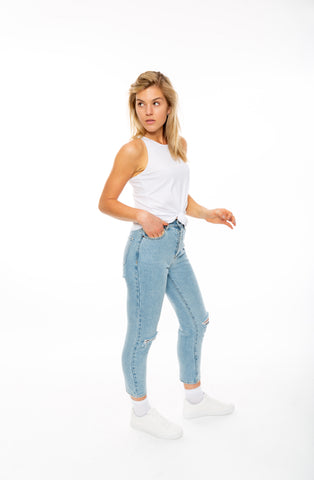the benefits of organic fabric
health and environmental benefits

we’ve probably all been told that we should be eating organic foods by at least one person in our lives. or maybe you’ve walked down the aisle at target and noticed a separate section for organic cleaning products! well, we bet that only a handful of us have heard that our clothes could also be organic. are we right?
and no, organic clothing is not just another luxury or fad that’ll die out in a few months! the concept of organic clothing is hard to wrap your head around when we typically don’t think of clothes as being “non-organic” in the first place. at least with vegetables, we can actually imagine what might happen on the farm, but with clothes, we don’t necessarily think of how they’re produced. we usually just assume that the process begins by being sewn together in the factory when in reality, the fabric has to come from somewhere else first. creating fabric begins one of two ways; it’s either synthetically produced, like nylon, or grown from a natural source, like cotton.
we gave you a little insight into what makes our fabrics so special in our previous blog post, but let’s talk about why you should care about the fabrics you put on your body in the first place!
what does organic clothing mean?
 the term organic might sound pretty repetitive at this point since we’re seeing so many advertised products throwing it around without really explaining what it means. organic products, like clothing, means that the crop that creates the fabric wasn’t treated with pesticides, insecticides, or other toxic chemicals. as you can imagine, these toxins are incredibly harmful to farmers, workers, the eco-system, and yes, even to you!
the term organic might sound pretty repetitive at this point since we’re seeing so many advertised products throwing it around without really explaining what it means. organic products, like clothing, means that the crop that creates the fabric wasn’t treated with pesticides, insecticides, or other toxic chemicals. as you can imagine, these toxins are incredibly harmful to farmers, workers, the eco-system, and yes, even to you!
these chemicals that are meant to keep the crops alive are just killing our farmers and animals in return. non-organic farming is so toxic that it’s causing an increase of early deaths and diagnoses of cancer in thousands of our u.s farmers. each year, pesticides also kill 67 million birds according to the u.s fish and wildlife service. it’s scary enough to think about the true cost of our food but it’s even worse to think about what it takes to produce the clothes we wear.
the benefits of organic clothing

any time we have skin irritation, rashes, headaches, or even dizziness, we usually blame it on either the food we ate or our terrible habit of prioritizing coffee over water. don’t get us wrong, it may be one of those things! but, we always forget that there’s one other culprit, our clothing. non-organic fabric can really put a damper on your day because of the chemical residue that gets stuck inside the threads of our clothes. with organic, you’ll never have to worry about any of this because simply, it’s just clean material that your body needs.
since organic farming doesn’t spray any harsh chemicals, this means that we’re not poisoning our rivers or bodies of water anytime it rains. reducing the spread of pesticide residue in any way we can is so important because it’s been found in farm animals, our food, and even in breast milk.
natural and sustainable fibers
now, you might be feeling a little overwhelmed by now because maybe you never even heard of organic clothing. and that’s okay because we have some good news! you most likely are already familiar with some fabrics that are non-toxic and planet-friendly.
only wearing organic fabric is certainly an effective way to protect your skin and the environment from harsh chemicals, but it’s not the only way! sometimes, organic just isn’t accessible or convenient to find but it doesn’t mean that your wardrobe can’t be sustainable and safe. what matters most is the type of fabric and how it’s been produced.
natural fibers like bamboo, hemp, and linen are naturally hypoallergenic and have anti-bacterial properties. fabrics like these are considered natural fibers because they are made from a natural resource rather than chemically produced which makes them an eco-friendly option. when going for the natural fabrics, you’ll always have the peace of mind that you won’t experience any skin irritation and at the end of its life, it’ll biodegrade and will return to the earth!
one last little tip is to always check the label for something that says “oeko-tex.” this label means that the textile has been checked and tested by the company, oeko-tex for harmful chemicals that may be harmful to your health. if you see this on a label or tag, you can be certain that every piece of the product is safe to wear on your body!
as you can see, there are a few ways that we can be sure we’re taking care of our health while shopping with the planet in mind. we really don’t mean that you should throw out all your old clothes and create a new, 100% organic wardrobe. when it comes to sustainability, the most important thing to remember is that everything should be done slow and smooth. in production that is, but also in the way you transition your lifestyle. keep what you have, and be mindful of fabrics you repurchase. if you can, always choose organic, sustainable, or natural-based materials!
xo,

